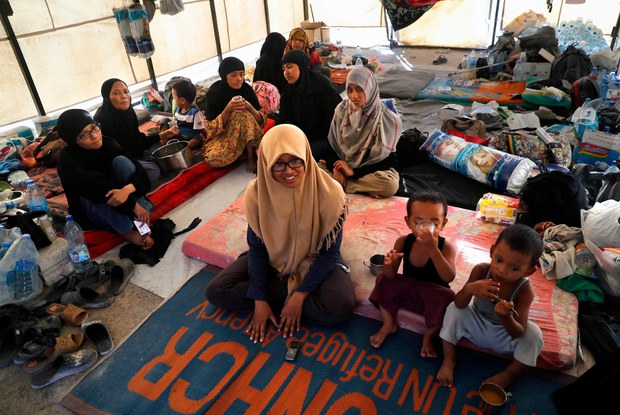Indonesia: Surveys Show Students Exposed to Radical Islam Ideology
2018.05.03
Jakarta and Padang, Indonesia
 An Indonesian family who escaped from the Islamic State in Raqqa gather inside their tent at a refugee camp, in Ain Issa, Syria, July 24, 2017.
An Indonesian family who escaped from the Islamic State in Raqqa gather inside their tent at a refugee camp, in Ain Issa, Syria, July 24, 2017.
About 39 percent of Indonesian university students have been exposed to radical Islamic ideology, Suhardi Alius, the head of Indonesia’s National Counterterrorism Agency (BNPT), told BenarNews.
The counter-terror chief confirmed a figure given April 28 by Budi Gunawan, the head of Indonesia’s National Intelligence Agency (BIN), during a lecture to a college seminar in Semarang, Central Java.
“That’s an estimate, we’re talking about a survey. That’s what it indicated,” Suhardi said in Padang, West Sumatra, on Wednesday. “The important thing … is that we recognize and prevent it.”
“Not just students, but their teachers also must be monitored,” he said. “These days I’m always visiting campuses.”
Wawan Purwanto, a BIN spokesman, said the figure came from BIN internal research conducted at state and private universities in 15 provinces in 2017.
“Three universities attracted BIN’s notice because of the high levels of dissemination of and support for radicalism and extremism,” Wawan said.
He declined to name the universities but said their rectors had been notified so they could address the situation.
“Ignorning it could have a negative impact, as when a person who is a sympathizer later becomes a supporter of terrorist acts,” he told BenarNews.
On tens of thousands of questionnaires distributed at universities, he said, many respondents indicated they would support making Indonesia an Islamic state, and expressed support for the so-called Islamic State of Iraq and Syria, he said.
“They were asked to mark ‘agree,’ ‘don’t agree’ and ‘don’t know.’ The graphic showed that 24 percent of college students and 23.3 percent of high school students agree with the concept of violent jihad,” Wawan said.
Efforts to counter radicalism
Yenny Wahid, director of the Wahid Foundation, a non-governmental organization that promotes interreligious and cross cultural understanding, agreed that radicalism has been present on campuses for decades while efforts to counter it are relatively new.
“We see that there are efforts by the government to ward off radicalism, especially on campuses, but it needs to be continually increased,” she said. “Radicalization movements continue systematically, building narratives and offering dreams that in fact are far from reality.”
Wahid Foundation researcher Alamsyah M. Djafar cited research carried out in 2017 where 7.7 percent of 1,500 adults surveyed said they were prepared to carry out radical actions if they had the opportunity.
“The government should be concerned about this figure. It needs to be tackled with a variety of approaches,” he said.
Radicalism targets campuses because young people are easily influenced and do not have a deep understanding of religion, he said.
The figures cited by BIN and BNPT are consistent with findings of the Jakarta-based Alvara Research Center and Mata Air Foundation in October 2017. The groups polled 1,800 students from 25 leading universities in Indonesia and 2,400 students from high schools across Java and other islands.
“We asked about the state ideology with a statement saying, ‘The Islamic state is worth fighting for to implement more consistent Islamic teachings’ and 23.5 percent of college students agree, and 16.3 percent of high school students agree,” Alvara CEO Hasanuddin Ali told reporters in Jakarta
The survey revealed that 17.8 percent of university students and 18.3 percent of high school students preferred the concept of a caliphate ruled by a Muslim spiritual leader over Indonesia’s current republic.
Commitment
At a Bali meeting in September 2017, about 3,000 university leaders from across Indonesia declared their common commitment to root out intolerance and radicalism on campus.
Several Indonesian institutions have been working together to tackle the problem, according to Wawan, the BIN spokesman. He cited the Education Ministry, the Religious Affairs Ministry, the Indonesian Ulema Council and university rectors.
“It’s done openly through seminars, hoaxes on social media are corrected, cyber patrols so students don’t ingest raw information they encounter that could point them in the diection of radicalism and extremism,” he said.
The Ministry of Religious Affairs also is involved in efforts to prevent radicalism on campuses.
“We have a center of research on moderate religious education from pesantren (Islamic schools) all the way through to university levels,” said Kamaruddin Amin, the ministry’s director-general for Islamic education.
His department oversees the activities of extracuriccular religious groups run by students, through school officials. And if teachers are ignoring moderate curriculums and teaching radicalism “they can be reported, and we will train them,” he said.
A University of Indonesia spokeswoman, Rifelly Dewi Astuti, said the institution promotes the concept of Indonesian nationhood and pluralism, forbids intolerance and radicalism on campus, and has prevention mechanisms in place.
“They include counseling, monitoring of students’ academic records and periodic guidance every semester by academic counsellors in each department,” she said.







